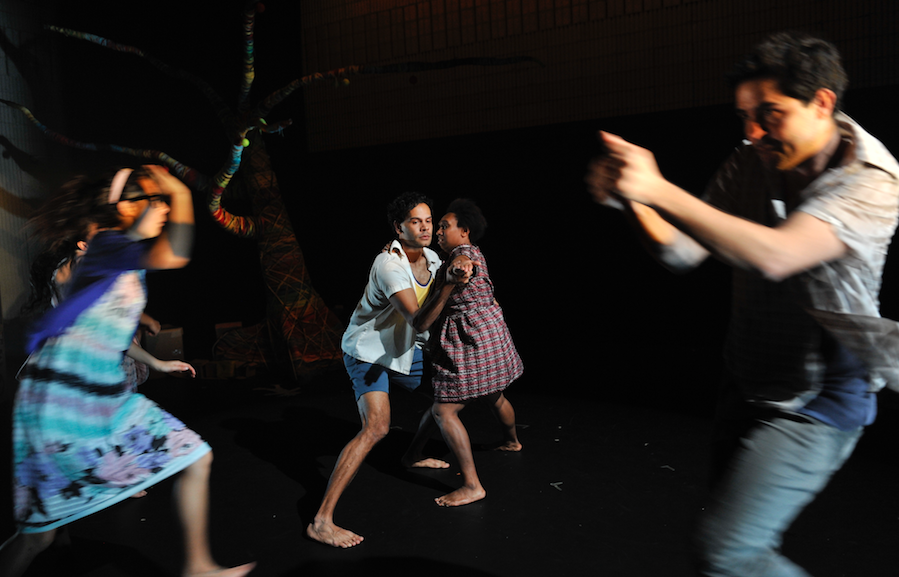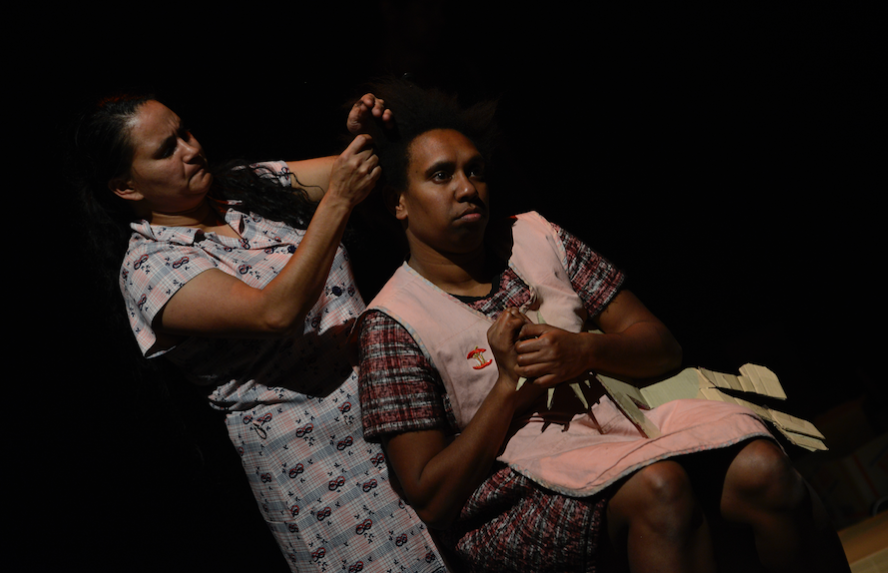★★★½☆ Australian classic on stolen generations gets fresh look with sprite in its step.
Riverside Lennox Theatre, Parramatta
June 3, 2016
Under a yarn-bombed tree, with its trunk and branches wrapped in a sunny mix of woollen colours, five indigenous children are acting out their ambitions. Ruby, Jimmy, Shirley, Sandy and Ann hilariously tumble over one another as they try on the aspirational skins of fireman, circus performer, movie star, bus driver, farmer. But a game-show buzzer sounds at each career suggestion, and these kids, played by adults, call out in unison: “Nah.”

The music box-like tinkling of the old Vegemite jingle – “helps put a rose in every cheek” – is rich in irony, not iron. These kids aren’t being built up for their potential; they’re mostly being primed for servitude. Ruby (Berthalia Selina Reuben) speaks to a doll as her mother. She dreams about the lolly shop and new dresses, and will be repeatedly called upon from the line-up: to be pressed and literally kicked into washing, cooking and scrubbing for white people. Her descent into madness is to come, presaged by hints of institutional sexual abuse: “I promised not to tell.”
Stolen was written by Jane Harrison, a playwright of Muruwari descent, who has said she most resembles the character Ann (Matilda Brown), the one among the five who gets brought up in a white family. Ann assumes she’s Spanish or South American, only to discover she has an Aboriginal mother. In one funny scene, Ann’s occupation of the space between black and white culture is apparent as she slathers herself in coconut oil to gain a tan. “I don’t need to,” she acknowledges.
Stolen, first directed by Wesley Enoch, a Noonuccal Nuggi man, and produced by Ilbijerri Aboriginal and Torres Strait Islander Theatre Cooperative and Playbox Theatre in Melbourne in 1998, emerged a year after the release of the Human Rights and Equal Opportunity Commission’s Bringing Them Home report. Bringing Them Home attempted to raise to public consciousness the personal stories of indigenous childhoods wrenched from birth families under government policies of assimilation and segregation.
What was already known as the stolen generations was perhaps the inevitable corollary of ideologies of European racial superiority and the grading begun under earlier state laws of fellow human beings’ identities as half-caste, quadroon and octoroon, based on the blood in their veins passed on by each parent, and the notion that the first Australians would eventually die out. While Australian indigenous cultures have proven themselves profoundly strong and resilient, Aboriginal children continue to be taken away, making Stolen a crucial contemporary play, not merely a piece of theatrical historicism.
The play is not one of linear, straight storytelling, but rather moves back and forth in time: although the five actors play together, they represent differing eras, and are not necessarily in the institution simultaneously. This narrative freedom allows Harrison – and various directors over the past two decades – to explore the inter-generational impact of government policies: Shirley, for instance, played here by Henrietta Baird, is a stolen child whose children are, in turn, stolen.

As per Harrison’s play directions, the Cranby Children’s Home was represented in earlier productions in literal form, by five iron beds across the stage. In this new production, director Vicki van Hout, of Wiradjuri descent, has pushed the design of the stage wide open, aided by designer Imogen Ross, dispensing with the iron beds, and under her yarn-bombed tree uses cardboard packing boxes taped together as furniture, a symbol of impermanence for the five children.
It’s a vivid and playful presentation that aids the imagination, with the respective erudition of composer and sound designer Phil Downing and lighting and video designer Toby K helping to keep the audience glued. Van Hout’s deep experience as a dancer and choreographer repositions Stolen as more of a physical theatre piece, dance helping criss-cross song lines. These actors gracefully play and fight others as well as themselves, making shapes and drawing on emotions that are both pleasing and distressing, conveying their hope through self-loathing. Van Hout retains the resolution of each character’s arc at the end, while applying a dancer’s more abstract sense of energy and connection to communicate the essence of each character to the other.
There are Dreamtime tales and mythology, and the nightmare of colonial invasion, too: Sandy (Kerri Simpson) tells us his mother and other women put sand inside themselves, to stop white men raping them, but they were raped anyway. At times I’d have liked the piece to slow down, to absorb more of the story of each character, even if that meant pushing out the running time of the crisply performed play. There’s a lot to digest here, and more emotion to tap given the tragic trajectories of Ruby and of Jimmy (Mathew Cooper), who never gets adopted and is falsely told his birth mother is dead. There is added complication to grasp given the actors must also switch into a range of other characters.
Van Hout told me in an interview a few years ago: “I try to get people to laugh first and think about the underlying implications later.” That approach is also evident here, and crucial in subject matter so deep and dark and potentially earnest. Simpson has a particular gift for comic delivery, particularly in a bar scene. Van Hout and her ensemble have delivered a fresh and emotionally affecting take on an Australian classic, well worth the trip to Sydney’s west for those who normally restrict their theatre diet to within their capital city.
National Theatre of Parramatta presents Stolen at the Lennox Theatre, Riverside until June 17











Comments
Log in to join the conversation.